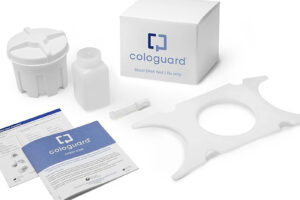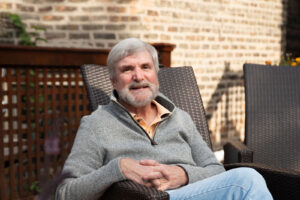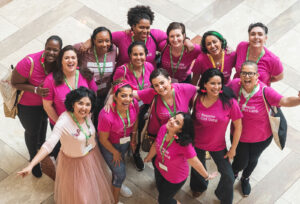We all know the importance of regular exercise for overall physical and even mental health, but fully adopting an active lifestyle can be easier said than done. And for those who have experienced a cancer diagnosis, the stakes and challenges are even higher. Cancer treatment can leave individuals with post-surgery restrictions and long-term side effects impacting energy levels, strength and mobility. Exercise can provide a multitude of benefits in managing side effects and decreasing risk of recurrence, but these very side effects and restrictions can make it even harder to get the recommended levels of activity.
Personalized training and support can help connect the dots for individuals wanting to redefine their approach to wellness in cancer survivorship, and LIVESTRONG at the YMCA offers just that. A free, 12-week exercise program for cancer survivors, LIVESTRONG at the YMCA teaches exercise as a key component of post-cancer recovery. The evidence-based program “helps adult cancer survivors reclaim their health and well-being after a cancer diagnosis,” says Phillip Jiménez, president and CEO of the West Cook YMCA in Oak Park, Illinois. Sessions occur twice weekly, with 90-minute classes focusing on cardiovascular and strength training and healthy lifestyle education.
Jiménez describes the LIVESTRONG program as “part of the YMCA’s commitment to the community — in addition to traditional programming, we wanted to tap into risk management [and] preventative and tertiary care,” with a focus on lifestyle changes to address chronic disease.
Jiménez says that the program helps cancer survivors “go from ‘I can’t’ to ‘I can’,” helping them establish understandings of various types of cardiovascular and strength training exercises and how to build a routine for an active lifestyle.
Although LIVESTRONG is a group program, participants progress through individualized training plans under the direction of the program instructors. The program starts with baseline measurements of cardiovascular fitness, range of motion and resistance training. From there, participants receive their custom plans to suit their particular needs and goals.
This customization is so important because of the incredible diversity of participants, Jiménez says. Although all participants have cancer in common, each person’s experience can vastly differ. The program is open to all cancer types, ages and genders. Within any one LIVESTRONG cohort, there are likely many different diagnoses, treatment plans and post-treatment challenges. LIVESTRONG instructors take all these factors into account when working with each participant. “The idea is to understand that each individual is there for a different reason,” Jiménez explains.
While the technical skills a participant learns in the LIVESTRONG program can help them overcome cancer-related physical changes and restrictions, Jiménez adds that cancer survivors also face significant emotional challenges. The LIVESTRONG program aims to provide the requisite empathy and individualized attention to help participants establish a whole-person approach to long-term wellness after cancer.
Through LIVESTRONG, participants adopt health and wellness “as a larger concept,” Jiménez says. “It’s not just about getting on a treadmill, losing weight or lowering BMI. It’s a full commitment to a person being as whole as possible.”
Beyond the requirements of fitness instruction, it takes specific skills from the program instructors for this approach to be successful, Jiménez says. In addition to having the technical knowledge and completing LIVESTRONG-specific training, instructors leading the program need to be compassionate and understanding of each participant’s situation.
Over the course of the 12-week program, participants learn specific skills and track their progress in flexibility and weight training. An end-of-program assessment measures each participant’s individual improvements compared to their original baseline measurement. And although this data helps each individual see their progress in a concrete way, Jiménez emphasizes that some of the most significant growth is a kind that cannot be measured or quantified.
“We have the pragmatic approach, where the program goals are met, we have good enrollment, participants complete the program and survey responses show that it was helpful. Those are the quantifiable, measurable results,” he says. However, he personally thinks that “the best measurement is whether the participants create a community.”
Jiménez acknowledges that cancer is a very lonely experience, and one of the most valuable outcomes of the LIVESTRONG program is the interpersonal bonds formed between participants. “To have someone right there with you who understands, that’s a community,” he says.
Jiménez emphasizes that while an individual’s internal healing can’t be measured, this component is critical to the program’s success. “You can’t underestimate the emotional healing that happens when someone is scared about the reality of not being themselves ever again, and then seeing that this doesn’t necessarily need to be true,” he says.
In a typical year, the West Cook YMCA offers four, 12-week sessions of the LIVESTRONG program, with approximately eight to 12 participants in each. Like most facilities over the past couple of years, the LIVESTRONG program and the YMCA more broadly has faced challenges with staffing as they re-emerge from pandemic-related setbacks. Staff shortages have impacted the availability of the LIVESTRONG program at the West Cook YMCA in recent years, though Jiménez notes the branch is keeping a participant waitlist, aiming to offer the next session of the program in early 2023. And if you’re not local to West Cook, there are 388 other YMCAs in the U.S., across 42 states, offering the program.
You can’t underestimate the emotional healing that happens when someone is scared about the reality of not being themselves ever again, and then seeing that this doesn’t necessarily need to be true.
Participants are encouraged to join the LIVESTRONG program no matter what their baseline may be in terms of physical and emotional recovery from cancer. Instructors are trained to meet each individual where they’re at, and the welcoming, supportive environment allows participants to safely develop an active lifestyle. Participants are also welcome to meet one-on-one with LIVESTRONG instructors ahead of time to cover any individual questions.
To anyone considering joining the LIVESTRONG program and seeking support as they navigate cancer survivorship, Jiménez offers some words of encouragement: “Anyone going through this journey doesn’t have to be alone. Reach out; explore this program with your community. We’re here to help you.”
To learn more about LIVESTRONG at the West Cook YMCA, and to register for the program waitlist, visit westcookymca.org/LIVESTRONG.







